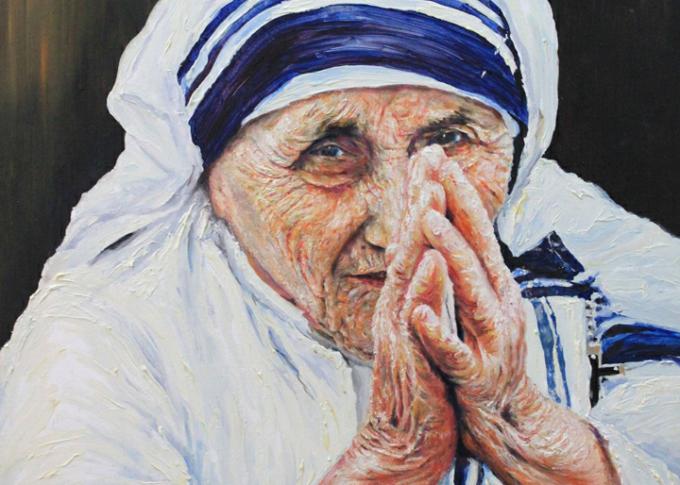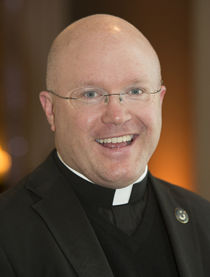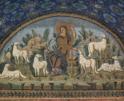
Faith
Mother Teresa said on that day, "I don't know how it will work out. I don't know whom we shall help. All I know is that there is poverty and need."

Landry
This is a week in which many of us slow down and thank God for the blessings he has given to us, to our family members and friends, and to our country.
The 400th anniversary of the first Thanksgiving in Plymouth, Massachusetts, should lead to thank God in a special way for all he has given over the course of the past four centuries, helping this land be transformed from a vast wilderness into the "experiment in ordered liberty" we have now, which remains the destination not only of tourists but also of millions of immigrants annually seeking to cross its borders.
Despite so many blessings, including extraordinary wealth, there remains great poverty in our country, both material and spiritual. I'd like, however, to celebrate and give God thanks for a group of holy women God has sent to address that two-fold poverty.
Fifty years ago, on October 18, 1971, St. Teresa of Calcutta arrived in New York City with the first Missionaries of Charity (MCs) to the United States.
Mother Teresa had founded the Missionaries of Charity in 1950, four years after she had had a mystical experience -- a call within her call as a religious -- when Jesus summoned her to satiate his thirst and care for him in the distressing disguise of the poorest of the poor. She left the Sisters of Loreto to found the MCs.
The sisters around her quickly grew and need for their care in India and beyond became heart wrenchingly obvious. By 1965, Pope St. Paul VI had erected them as a Pontifical Institute and they had permission, with the assent of local bishops, to open up houses in other countries. The first house outside of India was in Venezuela. The second house in this hemisphere was in New York City.
Mother Teresa had first visited the United States in 1960 to give some talks to women's groups. While in Manhattan, visiting with Dorothy Day, the future Servant of God took the future Saint to see the Bowery where Mother Teresa was shocked to see so many people lying sick on the streets a short distance from Wall Street. Day helped her to understand the demographics -- some were homeless, others elderly, and most were alcoholics or addicted to drugs -- and Mother never forgot the image of so many on the streets who were lonely, unwanted, and hungry for more than bread.
In 1969, Eileen Egan, a friend and supporter of Mother Teresa and longtime journalist, Pax Christi USA foundress, and staffer for the US Bishops' international relief efforts, told Cardinal Terence Cooke that Mother Teresa was interested in sending a team of sisters to work in the inner city. He got the ball rolling and extended an official invitation on June 3, 1971.
Four months later, on October 18, 1971, Cardinal Cooke welcomed Mother Teresa and the four first sisters to New York. It was the feast of St. Luke, the "evangelist of the poor." At first, Mother and the sisters stayed with the Franciscan Handmaids of Most Pure Heart of Mary, an historically Black Congregation of religious women, at their convent in Harlem. As the sisters got to know the situation better, determined a specific apostolate and found the best place to live so that they could respond to the poor.
Mother Teresa said on that day, "I don't know how it will work out. I don't know whom we shall help. All I know is that there is poverty and need."
In the last 50 years, the Missionaries of Charity have opened up 50 convents in the United States, 42 with active sisters and 8 with contemplatives. The Missionaries are present in Ashbury Park (NJ), Atlanta, Baltimore, Baton Rouge, Boston, Bridgeport, the Bronx, Brooklyn, Charlotte, Chester (PA), Chicago, Denver, Detroit, Gallup, Gary (IN), Harlem, Houston, Indianapolis, Jenkins (KY), Lafayette (LA), Lexington (KY), Little Rock, Los Angeles, Manhattan, Memphis, Miami, Minneapolis, Mahanoy City (PA), New Bedford (MA), Newark, Norristown (PA), Pacifica (CA), Phoenix, Plainfield (NJ), Richmond (CA), Sacramento, San Diego, San Francisco, Spokane, St. Louis, and Washington DC.
Of the 760 convents of Missionaries of Charity in 139 countries in the world, only India (244) has more than the United States. There is, of course, greater poverty in many places than in the United States, but the presence of so many Missionaries of Charity here is a sign, often ignored by the media, various politicians, citizens and others, of the great poverty -- material and spiritual -- that remains in our country and the multitudes who are in need.
Throughout the world, the Missionaries of Charity operate homes and programs for the abandoned, the sick and dying, for sick and forsaken children, lepers, refugees, prisoners, former prostitutes, the homeless, the mentally ill, people with AIDS, the blind, aged, convalescent, alcoholics, pregnant women, victims of floods, epidemics and famine.
When they arrived in New York 50 years ago, the began to visit the elderly, cut their nails, and clean up their houses, to visit a hospital in Jersey City, and to bring Catholic children to Mass. They also began to visit different sections of the city to see where they would be most needed. When they came to the South Bronx, they knew.
As the first superior of the house, Sr. Andrea, wrote in 1972, "The South Bronx you can only compare to one place: Calcutta. The empty, deserted, burned out and vandalized houses, look even more ghostly than any of Calcutta's slums, but in and around there live people, men, women, and children in great numbers, in great poverty and in terrible neglect."
The street where their present convent and U.S. Provincial Headquarters is located was called by those in the 1970s a "cemetery for dead cars," with windows and windshields smashed and insides torched. The neighborhood was just as bad, with people ubiquitously taking drugs around trashcan fire pits and the first (commercial) floor of most buildings burned out.
Yet that's where they chose to establish their mission. The opened up a soup kitchen and a shelter for homeless women. They visited the shut-ins in three different parishes. They started catechetical programs for children and adult catechesis in Spanish.
To help children stay off the streets, they opened a recreation center on the ground floor of their convent, with a small carpentry workshop for boys, hand-crafts for little girls, and cooking, typing, and sewing classes for older girls and neighborhood mothers. In the summers, with the help of the city, they organized summer camps.
In 1976, when Mother Teresa came to Philadelphia to give three talks at the international Eucharistic Congress, she announced that she was founding the first group of MC Contemplatives worldwide in the Bronx -- led by Sister Nirmala, who would become her successor -- to pray for the needs of the poor, the Church and the world.
I have been blessed, during my years as a seminarian and a priest to pray and serve alongside the Missionaries of Charity in Toronto, New Bedford, Costa Rica, Harlem, and the Bronx, to celebrate Mass for them, hear their confessions, preach retreats for them and teach workshops or various themes.
I had the joy to be with them in the Bronx as we prepared for their 50th anniversary in October and again on Nov. 14, the fifth World Day of the Poor, celebrating Mass for them at 6:45 a.m. before they left, as part of a world-wide prayer day, for a 9:00 a.m. video meeting with Pope Francis.
When Mother Teresa stated, a half-century ago, "I don't know how it will work out. I don't know whom we shall help," it's clear that I am among one of those her daughters have helped become a better Christian disciple and apostle as I seek to imitate their mission of charity. And I'm sure many of those reading can echo that same appreciation.
This Thanksgiving let's express our gratitude together to God for 50 years and 50 convents of the Missionaries of Charity and ask him to bless them with himself, many vocations and many apostolic fruits.
And let's ask him, through them, never to cease blessing us all.
- Father Roger J. Landry is a priest of the Diocese of Fall River, Massachusetts, who works for the Holy See's Permanent Observer Mission to the United Nations.
Recent articles in the Faith & Family section
-
Popular devotions and the liturgyFather Robert M. O’Grady
-
The Fight for Our FaithMaureen Crowley Heil
-
The shepherd's voiceScott Hahn
-
Scripture Reflection for April 21, 2024, Fourth Sunday of EasterJem Sullivan
-
The new Temple: How Easter changes religionDr. R. Jared Staudt


















